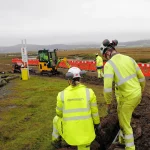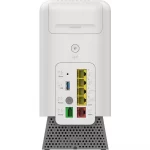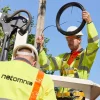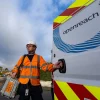The 2020 vs 2019 Top Fastest UK Mobile and Home Broadband ISPs

As usual we’re ending 2020 by taking a quick look back over the year to see how average download and upload speeds have changed across the top national fixed line home broadband ISPs and mobile network operators. Predictably, the rising take-up of faster connections has resulted in a general improvement.
The service speeds measured in this article tend to be impacted by two primary factors, such as the rising levels of network coverage by faster broadband technologies and their associated take-up by consumers. In that sense Ofcom’s latest coverage data should help to put the current market into some context.
| Fixed Connection | 2020 Cover | 2019 Cover | 2020 Take-up | 2019 Take-up |
| % Under 10Mbps (USO) | 2% (0.6% inc. 4G) | 2% | no data | 71% |
| Superfast (30Mbps+) | 96% | 95% | 60% | 57% |
| Gigabit (1000Mbps+) | 27% | n/a | n/a | n/a |
| Full Fibre (FTTP) | 18% | 10% | 25% | 30% |
During 2020 there have been several big developments. Firstly, the new generation of 1000Mbps+ (Gigabit) capable “full fibre” (FTTP) networks have continued their rapid roll-out across the United Kingdom, rising from 10% of premises last year to 18% now. Secondly, Virgin Media’s upgrade to their similarly fast DOCSIS 3.1 technology (downstream), which is expected to reach c.16 million premises by the end of 2021, continues to spread (this is also helping to fuel the gigabit coverage figure).
Advertisement
Finally, all four of the primary Mobile Network Operators (MNO) have now begun to roll-out faster 5G (mobile broadband) technology, but at present most of these can only access a modest slice of the 3.4GHz band (plus some dynamic use of existing 4G bands) and coverage remains limited. On top of that the UK Government’s decision to ban Huawei is also expected to significantly delay this roll-out (here), particularly for EE and Vodafone.
Meanwhile 4G geographic coverage is as follows: EE 85%, Vodafone 82%, O2 80% and Three UK 79%, although this is expected to receive a gradual boost from the £1bn Shared Rural Network (SRN) project that aims to hit 95% coverage by the end of 2025 from at least one operator (i.e. each operator must hit at least 90% by then).
Despite all this progress it’s worth remembering that most consumers will still be using slower packages and technologies, which tends to result in a more gradual performance improvement through natural upgrading.
Fastest Fixed Line Broadband ISPs (H2 2020)
The following results stem from Thinkbroadband‘s independent speedtest database (including ISPreview’s Broadband Speedtest) and we’ve only included independent ISPs with strong national availability. We would have liked to cover smaller alternative network (altnet) ISPs too but they aren’t yet available to the majority of premises and don’t produce enough data, although we have still added a few examples of those later on.
Advertisement
As usual there are some common caveats to consider with speedtest based results, not least that such scores tend to be more reflective of take-up than network availability. For example, some ISPs may have a much larger proportion of customers on slower copper ADSL lines and that can weigh against anybody on faster fibre services with the same provider (i.e. pushing average speeds down).
Average Download Speeds – Top 10
| No. | Operator | 2020 (Top 10%) | 2019 (Top 10%) | Change % |
| 1. | Virgin Media | 118.3Mbps (236.9Mbps) | 85.6Mbps (193.8Mbps) | +38.2% |
| 2. | AAISP | 53.6Mbps (99.8Mbps) | no data | n/a |
| 3. | BT | 46.2Mbps (72.8Mbps) | 35.1Mbps (66.8Mbps) | +31.61% |
| 4. | Vodafone | 45.1Mbps (71.6Mbps) | 38.2Mbps (67.7Mbps) | +18.06% |
| 5. | iDNET | 42Mbps (71.5Mbps) | 41.2Mbps (70.2Mbps) | +1.94% |
| 5. | Zen Internet | 40.8Mbps (70.7Mbps) | 46.4Mbps (74.4Mbps) | -12.07% |
| 7. | EE | 30.4Mbps (62.8Mbps) | 27.6Mbps (57.4Mbps) | +10.14% |
| 8. | TalkTalk | 28Mbps (56.6Mbps) | 24.3Mbps (48.2Mbps) | +15.23% |
| 9. | Sky Broadband (tied) | 27.7Mbps (58.5Mbps) | 25.4Mbps (54.4Mbps) | +9.06% |
| 10. | Plusnet | 25.6Mbps (53.2Mbps) | 24.2Mbps (50.5Mbps) | +5.79% |
Average Upload Speeds – Top 10
| No. | Operator | 2020 |
2019 |
Change % |
| 1. | Virgin Media | 14.9Mbps | 13.6Mbps | +9.56% |
| 2. | Zen Internet | 14.3Mbps | 13Mbps | +10% |
| 3. | AAISP | 14Mbps | no data | n/a |
| 4. | Vodafone | 13.3Mbps | 10.6Mbps | +25.47% |
| 5. | BT | 11Mbps | 8.7Mbps | +26.44% |
| 6. | iDNET | 10.3Mbps | 10.8Mbps | -4.63% |
| 7. | EE | 7.3Mbps | 6.7Mbps | +8.96% |
| 8. | Sky Broadband | 7.1Mbps | 6.3Mbps | +12.7% |
| 9. | TalkTalk | 7Mbps | 5.7Mbps | +22.81% |
| 10. | Plusnet | 6.1Mbps | 5.7Mbps | +7.02% |
Overall, the average download speed of the top national providers was 45.77Mbps (up from 38.66Mbps at the end of 2019) and the average upload speed hit 10.53Mbps (up from 9.01Mbps).
Advertisement
Naturally, Virgin Media’s new 1Gbps package and general speed boosts in other areas have continued to help them retain their top position among the national providers. But the biggest mover has to be BT, which saw that download ranking move from 5th to 3rd and we suspect that’s partly down to the launch of their first FTTP plans earlier in 2020.
On the flip side Zen Internet appears to have suffered a fall in performance and we’ll be watching to see if they bounce back in time for our next biannual update in 2021.
Now flick over to page 2 to see how the fastest alternative network ISPs and mobile operators performed.
Mark is a professional technology writer, IT consultant and computer engineer from Dorset (England), he also founded ISPreview in 1999 and enjoys analysing the latest telecoms and broadband developments. Find me on X (Twitter), Mastodon, Facebook, BlueSky, Threads.net and Linkedin.
« Airbus May Move OneWeb Satellite Manufacturing to UK After All




















































Hi Mark quick question, Vodafone on FTTP is it Symmetrical ? Thanks.
Yes and No. If you are in a City Fibre area you can get Symmetric but if you are in their trial area for Openreach it’s going to be Asymmetric.
I thought so and I should have said city fibre areas cheers
Is it time for me to leave Vodafone and join Smarty better download speeds…
I just left them to move to Voxi, Vodafone’s own MVNO, this was because the download speeds on Voxi 4G are much better, but the downside is your signal can drop from their 4G service to EDGE which is just diabolical, with Smarty you get 3G or 4G, both work much better then EDGE, also with Smarty you get WiFi calling and Voice over LTE calling, add to that they are launching an app soon and a 5G service at some point and I’m already thinking of moving back! I may wait for their app to come out or 5G plans. But I rate Smarty for sure.
I wouldn’t for now at least another year. I have been on/off with the Three network for about 8 years occasionally getting a PAYG sim for projects and stuff and I can certainly say Three in the early days of 4G were ok but in the past 2/3years the network is diabolical! Why is because too much contention with the crazily low cost for high amounts of data has overloaded the backhaul and also to say the signal hasn’t been that great either.
So what has that got to do with Smarty, well they run on Three and its pretty much a free for all trying to get any use data wise due to the contention minding that Three are also doing unlimited ’Home Broadband’ that takes up spectrum and backhaul on their 4G for cheaper than a VDSL line with a fixed provider. I was with Smarty from January to October just before they announced WiFi calling which probably would’ve solved my signal problem in the house but it isn’t good enough when your paying for a 30Gig plan each month and only using 4gigs as the speed and dire signal. I’m now with Vodafone 12Gb which is a-lot less but at least its more than useable and amazing signal indoors although this would vary depending on your home location.
I have Smarty right now and I love it. It has recently got so much better since they added VoLTE and WiFi Calling since it takes some strain off the network. I get 70 Mbps down and 20 Mbps up on my Galaxy A5 2017 on smarty so I think 30GB for £10 is a good deal. Use my link for 1 month free
http://referme.to/IaLhAtp
Given, as stated, customers may only be purchasing a lower speed product the data could be augmented to show the proportions of customers on each speed product. Further it would also be interesting to see what proportion of users were receiving within 10% of the speed quoted for the product they pay for, which may be a better indication of the ‘quality’ of that ISP
Meanwhile on three 4g I’m averaging 0.2 to 1 m/bits down in South London.
Granted it is internet delivered over the air as opposed to through a wire but the technology should be the same with the mast and backhaul serving a particular area identical to the cabinet serving multiple fixed line connections.
How can cabinets serve multiple users with no deterioration in speeds whereas masts can not.
I know congestion is the problem because in the early hours in the morning i have seen speeds of 40 to 50 m//bits occasionally.
Its all down to the topology. Wired/cabled/fibre systems generally have more bandwidth throughout the system. With cabinets you have a fibre link to the cabinet, and then individual copper pairs to each subscriber, so the pinch point is the fibre link. With 4g, there is only limited bandwith that the operator owns, and this is used to connect all subscribers in that area, then there is the backhaul link.
So 4g is more akin to all subscribers sharing the one copper pair, rather than separate links to the cabinet, so the primary link is the pinch point, rather than the backhaul (though can be sometimes a problem).
Generally Three gives me 60Mbps down / 12Mbps up, seen peaks of 160Mbps down / 24Mbps up, lows of 8Mbps down / 12Mbps up. I find congestion affects download more than upload. Still better than 3Mbps/380Kbps ADSL
Lee, have you tried Cellmapper? I find Cellmapper shows me who covers most my local area and what masts cover my local streets. South London is here but check what providers offer: https://www.cellmapper.net/map?MCC=234&MNC=30&type=LTE&latitude=51.501355800804845&longitude=-0.1079656714615808&zoom=14.451883808181277&showTowers=true&showTowerLabels=true&clusterEnabled=false&tilesEnabled=true&showOrphans=false&showNoFrequencyOnly=false&showFrequencyOnly=false&showBandwidthOnly=false&DateFilterType=None&showHex=false&showVerifiedOnly=false&showUnverifiedOnly=false&showLTECAOnly=false&showENDCOnly=false&showBand=0&showSectorColours=true&mapType=roadmap
The tables don’t show stats for reliability.
In my area of North West London there is a lot of chatter on nextdoor website about repeated long lasting Virgin outages (and some for Sky also).
I’m seriously thinking about getting a 4g backup router and PAYG data on EE or Three (retail or wholesale). Have managed short outages on Sky with mobile phone tethering but that isn’t ideal
In fact one could argue that speed can be orthagonal to reliability, inasmuch as you can reduce your SNR margin to squeeze out a few extra Mbps, at the risk of dropping offline.
That said, it’s no coincidence that most providers offering high-level FTTP to people this year have done better than those that didn’t.
Bit surprised that Zen went down, but perhaps some on its plans skipped to BT once it became available? Or maybe they’re using a new IP range for FTTP and it wasn’t included? (That one seems a bit far-fetched, but everyone’s been a bit preoccupied this year and mistakes happen.)
Wow, so BT beats my ISP IDNET, and Three beats Vodafone! And I’ve recently moved from Smarty to Voxi.. hmm. Actually been thinking about wether to stay on IDNET or move to BT. At least with MVNO’s with no contracts it’s dead simple to move now a days. The difference with Three is unlike Vodafone they don’t use EDGE or 2G so you always get 3G or 4G, even if the 3G can be faster it’s much better then EDGE.
Little known, three DO actually have an EDGE network. Once in a while the MBNL (EE & 3) mast by my house breaks and EE completely breaks and Three’s EDGE kicks in. I have seen this by the E on my signal bar on my phone. I am on SMARTY.
I have used Three’s unlimited data plans for several years and found the speed very good. On 4G I get some 60-80 Mbps download, 27-30 Mbps upload, with ping of some 40 ms. Virgin Mobile gives some 20 Mbps, 16 Mbps and 25 ms in comparison, both at New Milton. Reception on Vodafone (Virgin Mobile) is supposed to be excellent and indeed is very good, but their speed is average and sucks in comparison to Three. I have found Three provides faster speeds wherever I have lived and am skeptical of speed comparisons on websites. I would recommend trying more than one provider when choosing a mobile data plan.